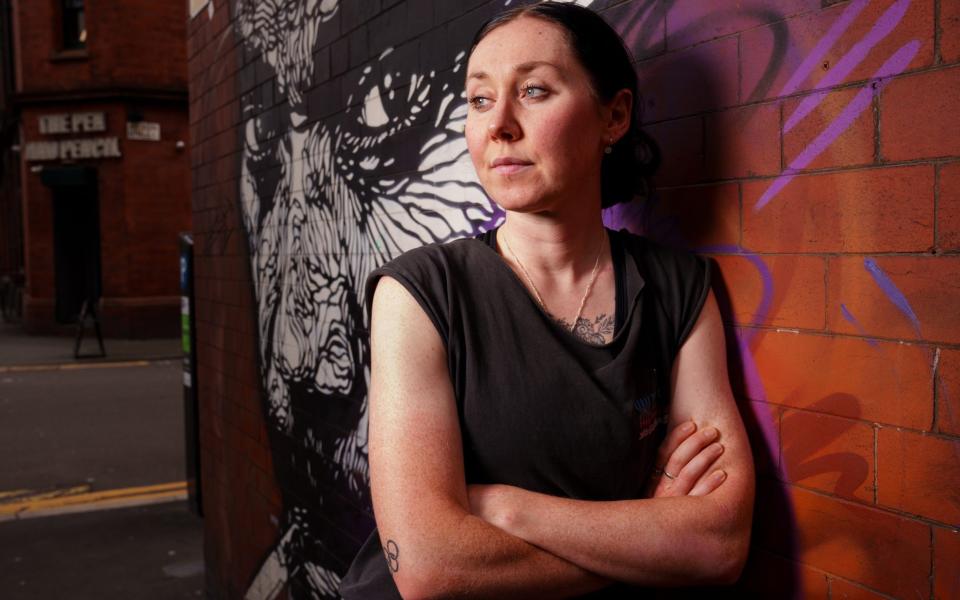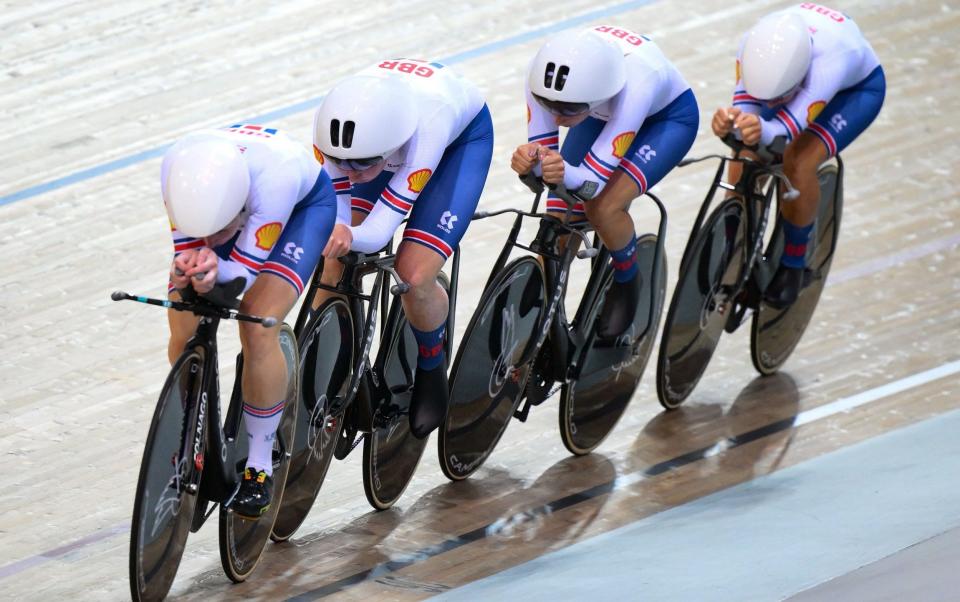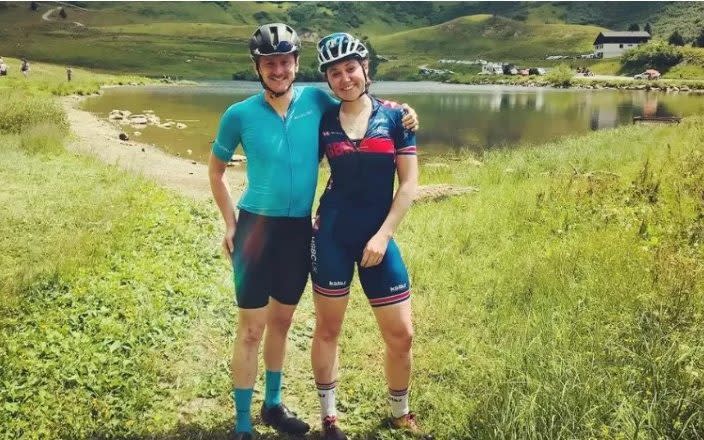Katie Archibald went through hell and back – now she has her sights on LA 2028

After the two years from hell that she had been through in the build-up to the Paris Olympics, a journey which would have broken many, it was ironic that it was something as mundane as a garden step that tripped up Katie Archibald in the end.
“Yeah, it was a peculiar one - and when I say peculiar I mean s----,” says the Scot, three months on from the freak accident that caused her to dislocate her ankle, break her tibia and fibula and rip two ligaments off the bone.
Archibald, who had lost her partner, the Scottish mountain bike champion Rab Wardell, in the most harrowing circumstances in 2022, when they were lying in bed together; who had fought back from depression, and mental health issues, and broken bones; who was targeting an unprecedented three golds at this summer’s Games, was forced to watch events in Paris unfold on the television instead.
“It was almost perverse how something so inconsequential could have such big consequences,” she adds. “It was just a little step down at the back of my home. We’ve got some uneven tiles. I tripped on my right foot and rolled my left.
“I think I was maybe predisposed to doing it because I’ve sprained my ankle loads of times. The last time was when I went over the bonnet of a car in a road accident last year. The ligaments get stretched and they’re never been quite the same again.”

Archibald is speaking for the first time about the injury because she is about to be back in the public eye again.
On Monday, the two-time Olympic gold medallist was named in Great Britain’s squad for next week’s Track World Championships in Ballerup, Denmark.
It was a relief to see her name on the team sheet. Not only because it means that she is fit again (“Well, relatively,” she stresses. “I only did my fourth team pursuit session yesterday, so my form is a bit unknown”) but for what it implies.
The first World Championships after an Olympics is always a funny one. Some riders retire. Some want a rest. A few new faces come to the fore.
At 30, it is fair to say there were fears from some within British Cycling that Archibald’s latest setback might have proved terminal as far as her track career was concerned.
After all the heartache she had endured, would she really have the strength and motivation to continue on to Los Angeles in four years’ time?
The answer, it appears, is a resounding yes.
‘I didn’t want pity’
The last three months have clearly been a voyage of discovery for Archibald, a healing journey in more ways than one. The initial shock of the accident was severe, of course. “But it didn’t hit me like a train,” she says.
Perhaps that was because she was still in denial. Even after surgery to pin the bones back together and reattach the ligaments. Even after being told by doctors and then by British Cycling that she would not be part of the Olympic team.
“When I got home, my friends said, ‘It looks like you can put a bit of weight on it’. Suddenly I was like, ‘I’m not sure I can trust them [the doctors]’. So I asked to stay on the [Olympic] long list.
“In a sense, though, that made it worse. My friends said, ‘If you want to fight for it, then fight for it…’ But that put it in my hands.
“It was actually a relief when Sparky [British Cycling performance director Stephen Park] called me and said he wouldn’t keep me as a non-travelling reserve. He said it would be negligent to do so as I could potentially injure myself further trying to get fit. It was a kindness because I could then blame someone else. I didn’t have to blame myself.”
Contrary to all expectations, including hers, the Olympics were not actually that painful to follow from home.
Archibald found herself swept up in the drama, the crashes, the close-shaves, Emma Finucane’s bid for three golds rather than her own.
“It was weird,” she admits. “When the track cycling started, you know when you notice that you’re being short with people? A bit unreasonable? It kind of snuck up on me. But once the racing got under way I actually found it the biggest escape.

“I’d spend every evening debriefing with Laura [Kenny] who was on the BBC, and every morning with Joanna [Rowsell] who was on Discovery. And there was so much to enjoy and to talk about. The biggest thing I needed distracting from actually became my biggest distraction. The fun of it all was actually my biggest salve.
“I just wanted to watch as a fan and enjoy it. There was one bit when they knew I was watching and it was like a Make-A-Wish foundation video with Chris Hoy! I didn’t want pity.”
Archibald watched on as her team-mates went so close in the team pursuit, losing out to eventual champions the United States by just 0.279 sec in what was effectively the semi-final and having to settle for a bronze medal. Did she not feel frustrated?
“Not really,” she says. “Things were coming good but I’d had too long of a rut and there was all the speculation that I was going to win all these [gold] medals. I’m not sat here with the confidence to say I would have affected the result.”
By the time the Olympics ended, Archibald was resolved in her mind: she wanted to come back. “It was clear to me that I wanted to go to LA,” she says. “I still love cycling. But I need to do this for me.”
Which means what exactly? “If you were going to psychoanalyse it, I don’t know, you would say that it shouldn’t be about ‘unfinished business’. It needs to be about love [for the sport]. And that’s not in question.
“I’m aware that I will have to be patient. Four years is a long time. I’ll be 34 by the time Los Angeles rolls around. The basic physics. But I know I have the capability. There have been times in the last few years when I really felt I’ve cracked the code.
“The stars didn’t align this time. But I’m fortunate enough to have the opportunity to go again. Not everyone has the chance to try to unlock this … So I feel I should.”
Archibald says she has been listening to American journalist David Epstein’s podcast, and in particular about the “explore/exploit trade-off”. “I’m very much in an explore mindset, off the bike as well as on it,” she says. “Trying to develop myself as a person and not get so hung up on success.”

In hindsight, Archibald says she was trying so hard to come back and “win for Rab”, at last year’s World Championships and at this year’s Games, that it was counter-productive.
“I realised how ridiculous that was. Rab loved me unconditionally. When I was on the start line, he would care what I did but not about the result. Essentially I need to do this for me.”
Archibald says she does not really know what to expect from next week’s World Championships (October 16-20), and she is fine with that. She is provisionally down to do the team pursuit and the Madison, the event in which she won such a memorable Olympic gold alongside Kenny in Tokyo. But she is not putting too much pressure on herself.
“I’m not really aiming for rainbow jerseys [the jersey given to world champions],” she says. “Obviously my team-mates’ ambitions are rainbows, so of course I’ll be giving it my all. But I’m just looking forward to being part of a squad and competing again.”
And getting on the dance floor at the end of it. “El [Elinor Barker, with whom Archibald won Olympic gold in the team pursuit in Rio] is actually getting married on the Sunday [to Danish cyclist Casper von Folsach] so she’s not racing. We’re all off to her wedding at the end of the week.
“So goal number one is to get to the end of the week, goal number two is to get out on the dance floor at El’s wedding. The ankle is better for cycling than dancing at the moment. But hopefully I’ll slay.”

 Yahoo Sports
Yahoo Sports 
